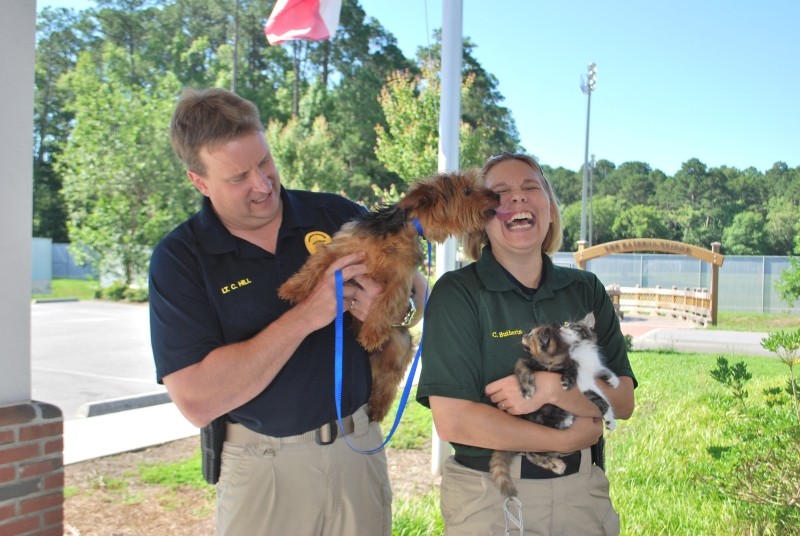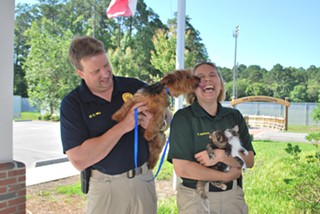EARLY LAST Tuesday morning, Savannah Chatham Animal Control officer Christina Sutherin received two dispatches within minutes of each other.
One was from Port Wentworth, where someone had reported an aggressive dog on the loose. The other came for another dog that was struck by a car in Midtown.
As the only officer on duty, Sutherin had to choose which direction to drive.
“I had to ask myself, ‘Do I go get what could possibly be a dangerous animal or do I help the injured one?’” she recounts.
She ended up answering the Port Wentworth call and postponed the other for another officer coming on duty a half hour later. But she regrets not being able to attend to both animals.
“At the end of the day, our number one goal is public safety,” she sighs.
As only one of five officers charged with answering the hundreds of calls a week from all over Chatham County—from the Effingham County line to Tybee Island, 440 square miles in all—it’s no wonder she’s pulled in multiple directions.
Sutherin and her colleagues must not only investigate neglected dogs and feral cats, but every complaint about errant deer, chickens, deer and the occasional pig.
“I got a call about a five-foot gator at two o’clock in the morning last week,” says the former animal trainer and three year SCAC veteran. “And we’re going to pick up a pair of fox kits this afternoon.”
The small staff never seems to be able to keep up with demand for their services, and SCAC commander Lt. Cary Hill says he receives plenty of criticism for delayed response times.
“People call and call and can’t get through,” sympathizes Lt. Hill. “I understand the public’s frustration.”
While some county residents chastise how long it takes to get rid of a family of raccoons, other community members have specific concerns regarding the function of the animal shelter, which takes in stray dogs and cats.
SCAC received two Dept. of Agriculture citations for inefficient record keeping and housing diseased animals with healthy ones in 2012. The recent temporary shutdown of its volunteer program has prompted an outcry that includes confusion about the rescue adoption process and accusations of animal neglect and egregious euthanizing.
Conditions relating to the 2012 citations were fixed promptly, and Lt. Hill assures that the volunteer program has been restructured to better serve the department and the animals, and that any remaining negativity is due to miscommunication.
“We met with some of the civilian groups, and once they understand where we want to go, they’re much more receptive,” he says.
Behind the imposing electric gate off Sallie Mood Drive, the atmosphere is surprisingly cheerful. In the front office, various wet noses peek out from behind desks, and there are the sounds of canine jaws enthusiastically enjoying a squeaky toy. Cats blink sleepily from a row of crates.
Outside, healthy-looking dogs bark from rows of cages. Occasionally, they are let out to play with a selection of rubber balls in the center courtyard.
But the perception that Animal Control is a horrific place that an animal never leaves once it enters is bolstered by statistics: According to SCAC’s reports, of the 5,148 dogs, cats and wildlife impounded in 2013, more than half were put down.
In the first quarter of 2014, 108 out of 337 dogs and 150 of 227 cats were euthanized at the facility.
Lt. Hill reminds that hard data doesn’t tell the whole story.
“When we talk about euthanasia and the numbers, you have to understand that we have to take everything that comes. We don’t get only adoptable animals here,” he explains. “There is sickness, there is aggression. That will drive those numbers.”
Abandoned animals are held for at least five days to see if their owners can be located, and are then assessed by a veterinarian for adoptability. Depending on space, a dog or cat might spend a month or more at the shelter before it’s put to sleep.
Sometimes those animals have been neglected by and seized from their owners, and the department breaks up hoarding situations at least monthly. As for the lost pets picked up off the street, Officer Sutherin regularly spends evenings after her shift cross-referencing alerts on Craigslist.
“No one comes to work here and wants to euthanize animals,” says Sutherin, her voice shaking slightly. “The public doesn’t see us in the shelter at 2 o’clock in the morning with a cheeseburger because we know it’s an animal’s last night.”
With stated objectives of transparency, respect and compassionate efficiency for both humans and animals, Sutherin and the other officers hope that citizens will return to the reworked volunteer program, which now has a set of written policies and procedures. While there were plenty of volunteers before the reorganization, they often couldn’t find direction from the already spread-thin staff.
“Now it’s much more streamlined and gives us people who are well-trained in specific areas,” says Sutherin.
“New volunteers can pick a particular activity such as walking dogs or playing with cats and be trained one-on-one. That hour of time is well spent because we know that person will know that duty very well.”
As of May, SCAC is also facilitating its own adoptions. Private agencies are still able to pull animals to pair with owners, but Lt. Hill notes that SCAC’s efforts are separate from non-profit Humane Society and breed-specific rescue organizations.
“We are a government agency, but our goal is the same. Any animal that is adoptable, we want to find a home for it.”
(To view dogs and cats up for adoption, “like” the SCAC Shelter’s Facebook page or visit animalcontrol.chathamcounty.org)
On June 3, Lt. Hill presented a budget proposal to the Chatham County Board of Commissioners to grant his department more money and staff, which has not seen an increase in 15 years. After a resounding rejection when he asked to double staff last year, he’s amended his request to ask for one supervisor, two more officers for the street and two more to work in the shelter.
“I understand what I need here, but I have to consider what that does to the taxpayers and everybody else’s budgets. I’ve got to be fair,” he says.
While the commissioners agree that the department is woefully underfunded, it’s not as simple as granting the department more money. The merged Savannah-Chatham Metro Police department—Animal Control’s parent agency—has always been a source of economic divisiveness.
District 6 Commissioner Lori Brady commends Lt. Hill and his officers for their valuable service and believes financial relief for the department should be a priority. However, she says that relief should not be shouldered by the county alone.
“If you look at the number of calls and service provided, you will see the majority of service is within the city limits of Savannah,” notes Brady, whose district includes unincorporated neighborhoods on the Southside and Skidaway Island.
“ALL municipalities and most importantly, the City of Savannah, should share in the funding of Animal Control. Currently, Chatham County Animal Control is fully funded by Chatham County.”
Brady’s point resonates with some and irks others, particularly City residents who also pay Chatham County taxes. Should the City of Savannah allocate funds to the agency, city residents may pay twice for Animal Control.
The County Commission votes on its new budget, including SCHC’s proposal, on June 27.
In the meantime, SCHC continues to re-establish its relationship with the community. Lt. Hill and Sutherin have a dream list that includes educational programming and a low-cost neuter and spay program. (An ordinance that would require mandatory spaying and neutering was tabled by the previous county commission and has yet to be revived by the current one.)
SCAC would also like to develop a better protocol to deal with feral cats, but that would take time—and more staff.
“We would love to be proactive and do the community outreach about how to be a responsible pet owner,” says Sutherin.
“But right now we’re just struggling to answer the amount of calls that come in every day.”

































